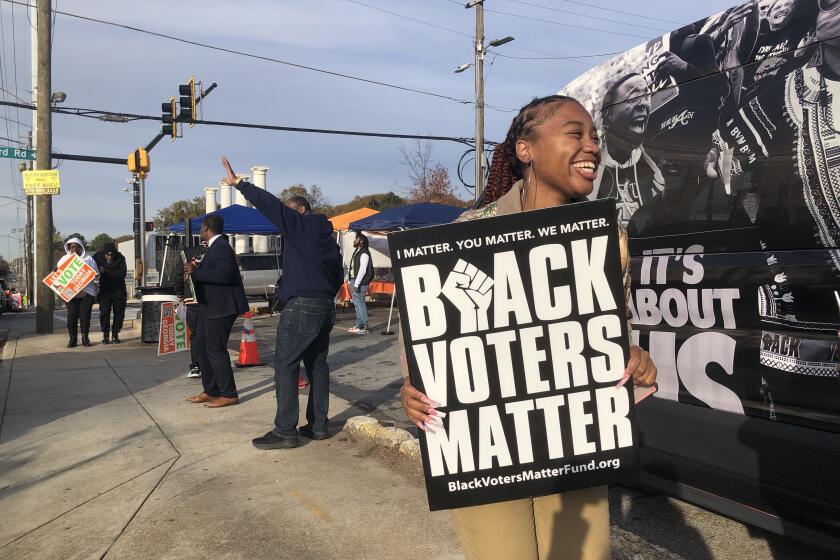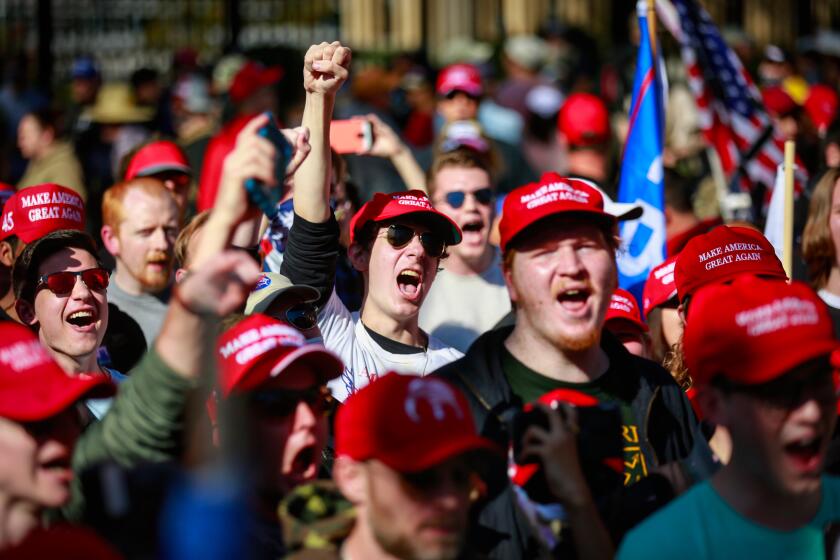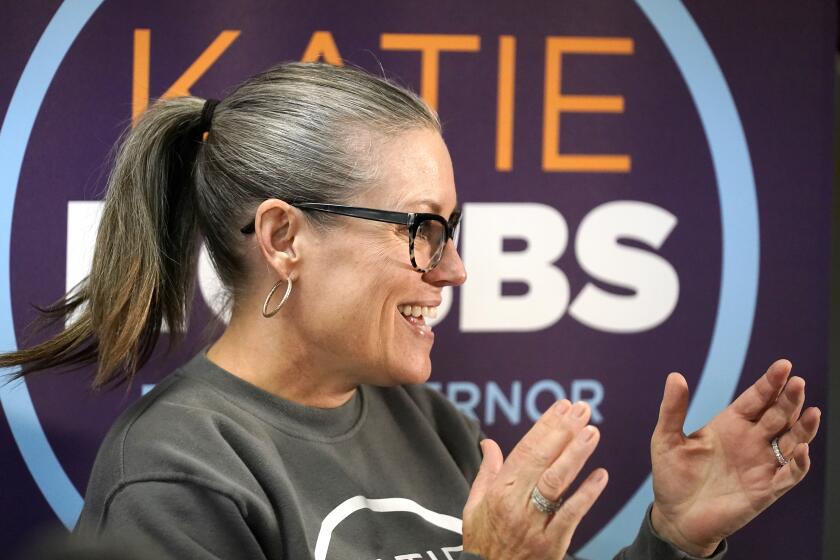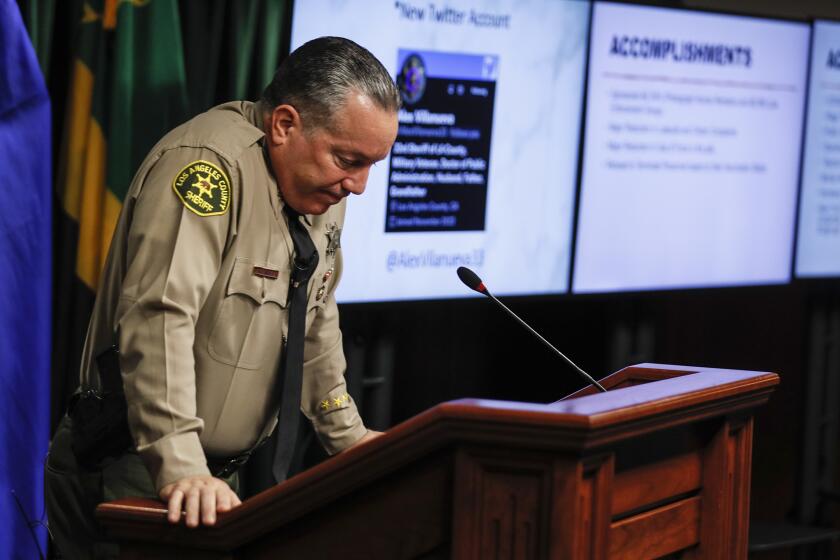Georgia Senate race between Raphael Warnock and Herschel Walker: 5 things to watch
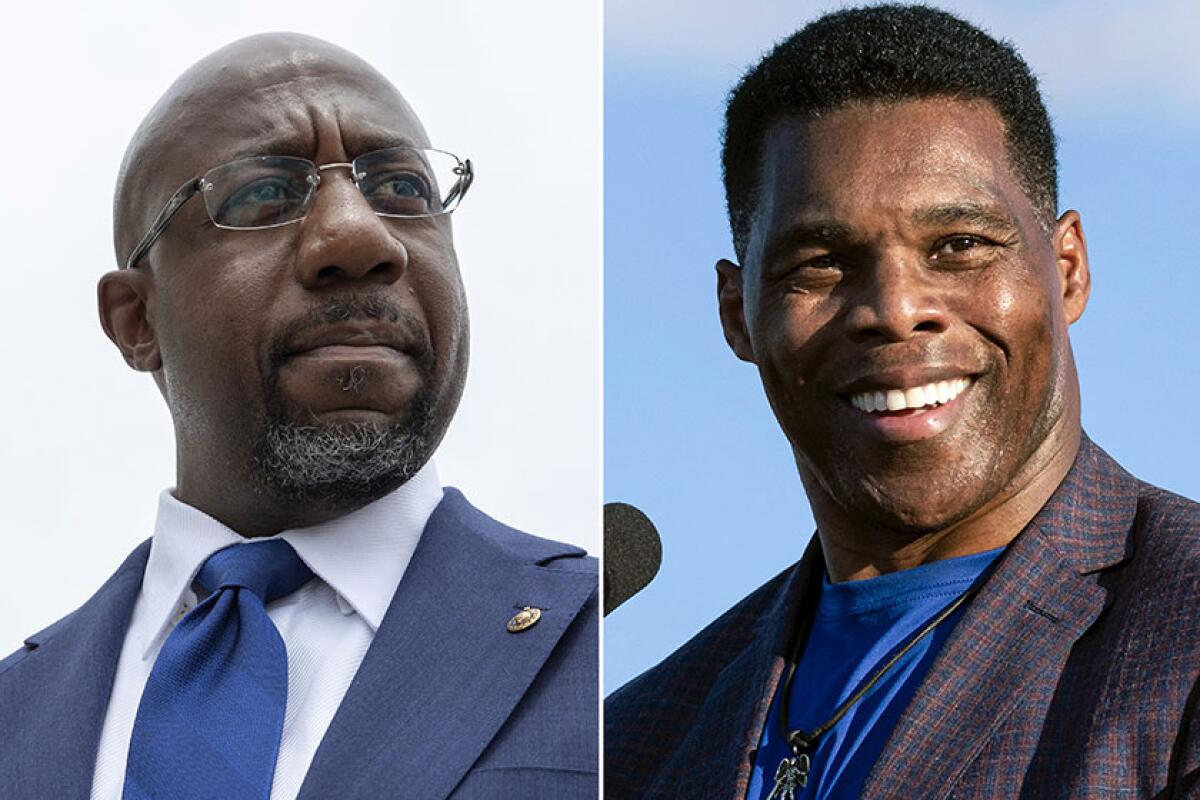
- Share via
ATLANTA — It’s election day, once again, in Georgia.
Soon residents of this Southern battleground state can breathe a sigh of relief that another election season is over — and with it a bombardment of negative campaign ads featuring candidates’ ex-wives and bizarre stump speeches delving into the relative merits of vampires and werewolves or the plotline of “Talladega Nights: The Ballad of Ricky Bobby.”
But first Georgians must determine the victor of the last U.S. Senate battle of the 2022 election cycle: a runoff between Democratic Sen. Raphael Warnock and Republican Herschel Walker.
Warnock, the senior pastor of the Rev. Martin Luther King’s Ebenezer Baptist Church in Atlanta, narrowly defeated then-Sen. Kelly Loeffler in a Jan. 5, 2021, special election that helped Democrats claim control of the Senate. Now he’s seeking a full six-year term. Neither Warnock nor Walker, a former University of Georgia football player who is backed by former President Trump, reached the 50%-plus-one-vote threshold needed to win outright in last month’s general election.
The runoff will decide whether Democrats keep their current 50-50 split in the Senate, relying on Vice President Kamala Harris to cast tiebreaking votes, or whether they win an absolute majority. In a 51-49 Senate, Democrats would no longer have to share power for committee assignments and would be less reliant on more conservative Democrats, such as Joe Manchin III of West Virginia and Kyrsten Sinema of Arizona, as they push the party’s legislative agenda.
Georgia’s Senate race between Democratic Sen. Raphael Warnock and Republican Herschel Walker is a question of turnout, voter access and scandals’ reach.
A Warnock victory would also be a major boon for Georgia progressives, signaling that Democrats’ narrow 2020 and 2021 Senate victories in this decades-long Republican stronghold were more than just a reaction to Trump and the beginning of a more enduring project to flip the state blue.
As Georgians head to polling stations to cast their ballots, here’s a primer on some of the key questions on election day:
How long will voters have to wait in line?
Georgia developed a national reputation for election day chaos after the 2018 midterm election. Some voters in many predominantly Black urban neighborhoods waited in line for hours or arrived at polling stations that had faulty voting machines or had run out of paper ballots. Others did not receive ballots or had their voter registration application rejected.
Electoral dysfunction continued in the 2020 primaries, when Georgia election workers were overwhelmed by the pandemic and a cascade of failures with the state’s new high-tech voting system. Since then, the 2020 general election and 2022 midterms ran relatively smoothly, without major waits at polling stations.
“Georgia’s voting system is working well,” Secretary of State Brad Raffensperger said last week toward the end of early voting.
But a sweeping Georgia voting law pushed through by Republicans last year made it harder to vote by absentee ballot and means this year’s runoff has a compressed schedule, with just one week of early voting.
Last week, many Georgians waited more than an hour at some metro Atlanta polling stations. Lines snaked around libraries and government buildings into the night on Friday, the last day of early voting. After early voting wrapped up, about 1.8 million people had cast ballots, compared with 2.5 million in the general election and 3 million in the 2021 Senate runoffs.
If Georgia sees longer lines on Tuesday, expect activists to ramp up their criticism of the state’s new law and accuse Republicans of voter suppression.
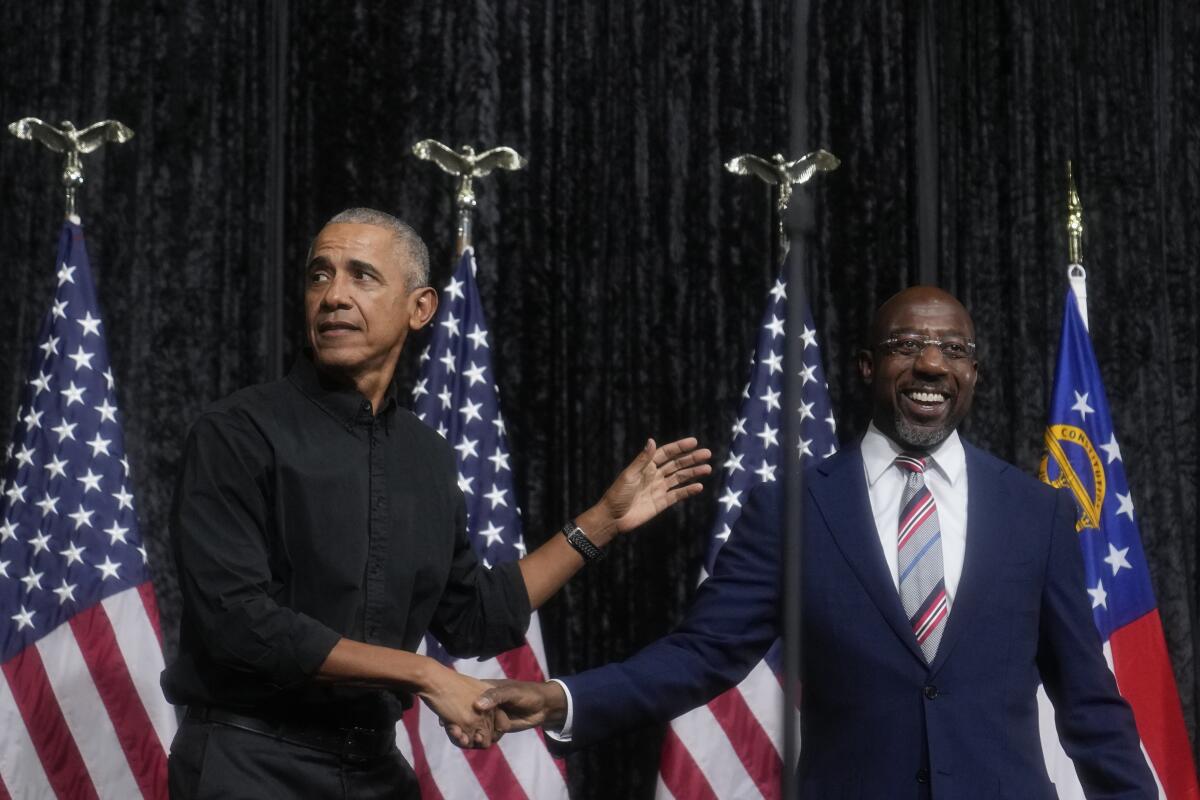
Will early turnout in Democratic strongholds push Warnock over the line?
Walker, who has been scrutinized over false claims and outlandish comments and beset by scandal, has tested Republicans and motivated many Democrats to vote because they consider him unfit for office.
After a week of early voting, according to state election data, more people had voted in predominantly urban and suburban counties that supported Warnock in the general election than in the rural and exurban counties that backed Walker.
Black voters, who form the backbone of the state’s Democratic Party, represent 32% of the overall early voting tally so far, a greater percentage than in early voting in last month’s general election.
“The votes, at least when we look at them demographically, more than likely favor Warnock, which fits with what we saw in Georgia the first time around and other states: Democrats built up a lead in early voting,” said Jessica Taylor, the Senate and governors editor for the nonpartisan Cook Political Report. “That is why I continue to think that Republicans ignore at the peril how important early and absentee voting is.”
Still, Taylor said, Democrats need a strong election day showing to make sure that the Republican turnout doesn’t overtake their head start.
Or will the GOP base pack the polls on election day?
Older, white Georgians — the bedrock of the Republican Party — typically show up in higher numbers on election day.
But will Republicans in small towns and rural and exurban areas flock to the polls in support of Walker? It is unclear if the GOP will lure them out in huge numbers without Gov. Brian Kemp and other more popular candidates on the ballot.
In November, Walker lagged behind Warnock by 38,000 votes in a state where Republicans won every other statewide seat by comfortable margins, and he received 200,000 fewer votes than Kemp.
Another factor that could put a damper on turnout, potentially putting the Republicans at a disadvantage: Rain is forecast throughout much of Georgia on election day.
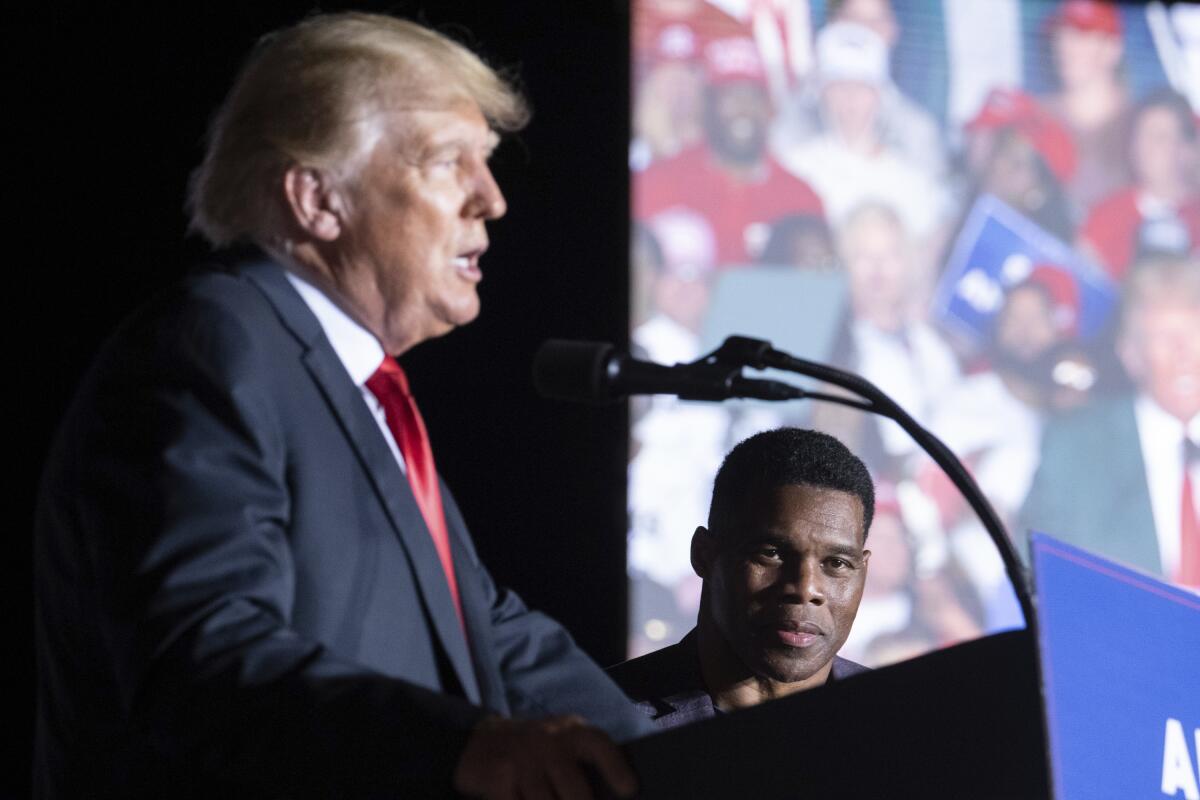
Will Trump’s influence make a difference either way?
Trump, who endorsed Walker early on and boosted him ahead of the May primary, remains a motivator for some in the Republican base.
But the former president’s lies about election fraud depressed GOP turnout and turned off swing voters in Georgia’s 2021 runoff. And his 2020 loss in the state — followed by the failure of many of his endorsed candidates in the midterms — have caused a growing number of Republicans to view him as a liability.
Going into the runoffs, Democrats used Walker’s Trump connection against him. A Warnock TV ad shows Trump gushing that Walker is “a fabulous human being,” only for a message to flash across the screen: “Stop Donald Trump. Stop Herschel Walker.”
Over the last month, Georgia Republicans pleaded with Trump not to come to the state to hold a rally for Walker, fearing the association could damage Walker’s standing with swing voters.
Will swing voters show up for Warnock?
In the general election, many voters split their ticket, voting for Kemp and Warnock. About 80,000 Georgians supported libertarian candidate Chase Oliver.
After the race went to a runoff, Kemp loaned his get-out-the-vote apparatus to Walker, joined him on the campaign trail and promised in a TV ad that his struggling fellow Republican would “not be another rubber stamp for Joe Biden.”
“Almost all of the campaign ads that are being seen from both Walker’s campaign and the PACs supporting him are not featuring Walker, they’re featuring Gov. Brian Kemp,” said Amy Steigerwalt, a political science professor at Georgia State University. “What they’re trying to do is bring those voters back, saying, “Nope, it’s OK; I can assuage your concerns. You were willing to vote for me. Now I need you to vote for him.”
But after appearing at one rally before Thanksgiving, Kemp has not appeared with Walker in the final two weeks of the runoff.
“I would think that a sitting governor could do a lot more,” said Erick Allen, a Democratic state representative. “He could be on the campaign trail with him every day right now. It’s not like he’s prohibited. I think he’s giving a wink and a nod, but he’s doing the bare minimum.”
Democrats have also made an explicit pitch to Kemp supporters, with a Warnock TV ad showcasing a Republican who voted in the general election for Kemp and Warnock.
Even though Republicans historically do better on turnout during runoff elections, Democrats could have an advantage if Warnock’s campaign convinces those split ticket voters to come out again, Steigerwalt said.
“They are already a set of voters who, in many ways, made a very conscious decision to vote based on policy,” she said.
More to Read
Get the L.A. Times Politics newsletter
Deeply reported insights into legislation, politics and policy from Sacramento, Washington and beyond. In your inbox three times per week.
You may occasionally receive promotional content from the Los Angeles Times.
